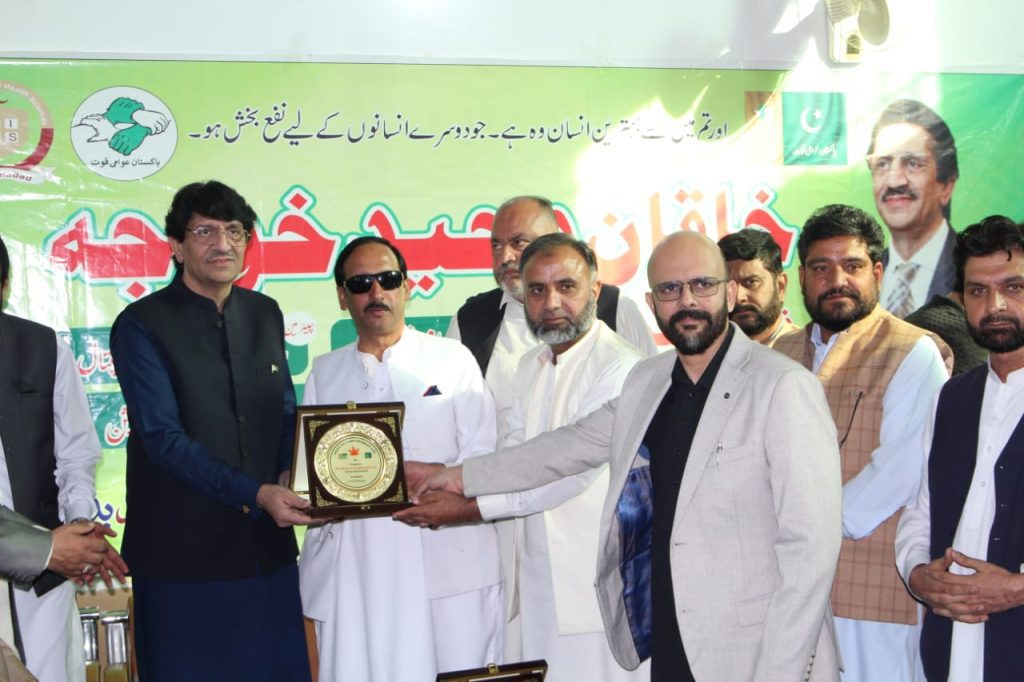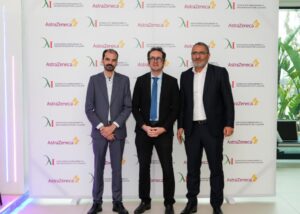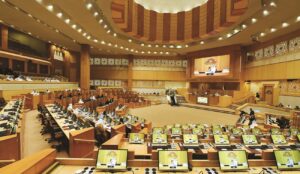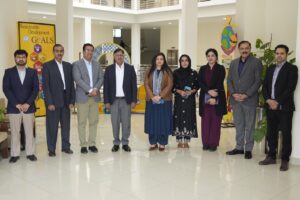PAQ Boosts Community Health in Dhirkot with Free Medical Camp and Launch of Affordable Health Card

Dhirkot, The Gulf Observer: In a major initiative to promote health, education, skills, and economic empowerment, Pakistan Awami Quwat (PAQ) organized a one-day medical camp in collaboration with Rawal Institute of Health Sciences (RIHS) at Dhirkot, a picturesque tehsil in District Bagh, Azad Kashmir. The event addressed urgent healthcare needs and was warmly received by the local community, with over 3,000 residents receiving free consultations, medications, and specialized care. The camp’s success demonstrates PAQ’s commitment to addressing critical healthcare needs while also promoting a broader agenda for socio-economic empowerment.
At a public gathering in Dhirkot, Azad Kashmir, Khaqan Waheed Khawaja, the leader of Pakistan Awami Quwat (PAQ), highlighted the significance of the newly launched Awami Health Card, describing it as a key initiative to safeguard universal health rights for all citizens. The announcement took place during a medical camp organized by Pakistan Awami Quwat and the doctors’ community from the Rawal Institute of Health Sciences (RIHS). The event brought together a large crowd of youth and elders, creating a dynamic atmosphere as Khawaja emphasized the transformative potential of community collaboration.
In his address, Mr. Khawaja underscored that “the power of the people lies in collaboration.” He explained that by working together, communities could tackle their most pressing issues, including healthcare challenges, without solely depending on external aid. This sentiment resonated with the gathering, as it emphasized local empowerment and self-sufficiency. Khawaja encouraged the youth to actively pursue scientific education and skill acquisition, stating that PAQ is dedicated to supporting their journey. This focus on education, he noted, is integral to PAQ’s political program, where human dignity and the well-being of citizens are prioritized above all.
Addressing the youth, Khawaja introduced PAQ’s broader strategy for sustainable development, designed to meet the evolving challenges of the 21st century. This holistic strategy, he explained, prioritizes health, education, and economic empowerment as pillars for sustainable community development. By equipping citizens with emerging technological skills, the party aims to enable them to contribute meaningfully to the country’s economic growth and secure their own futures. PAQ’s commitment to community-led decision-making was also a central theme, with Khawaja encouraging young people to actively participate in shaping their communities. He urged them to move beyond passivity, stressing that “you are the leaders; trust your own abilities.”
The concept of decentralization within PAQ’s political framework places responsibility and decision-making power directly in the hands of local communities, empowering them to create tailored solutions for their unique challenges. This approach reflects PAQ’s belief in localized governance and leadership that emerges from within communities, as opposed to imposed leadership from outside. Khawaja’s message encouraged the audience to recognize their potential as local leaders who can bring about positive changes for the welfare of their communities and the nation at large.

A significant part of the success lies in PAQ’s leadership, with the active participation of Chairman Khaqan Waheed Khawaja and Ms. Saleha Khaqan, Chairperson of RIHS. Both leaders engaged directly with attendees, showing a grounded approach to community health issues and reinforcing trust in PAQ’s social initiatives. Mr. Khawaja’s introduction of the Awami Health Card—a family health insurance plan costing PKR 13,500 annually—underscores a broader strategy to make healthcare accessible. The card represents a forward-thinking approach to medical insurance in a region where financial barriers often prevent access to necessary care.
The Awami Health Card, Khawaja explained, embodies PAQ’s commitment to accessible healthcare for all. Priced affordably, the card allows families to access medical services without financial burden, reducing the healthcare gap in communities like Dhirkot that have limited resources. He emphasized that the card is not just a health initiative but a step toward comprehensive social upliftment, facilitating access to essential services that many communities struggle to afford.
Through the Awami Health Card and PAQ’s focus on skill development, Khawaja outlined a path to self-reliance for Dhirkot’s residents and beyond. PAQ envisions a Pakistan where individuals are empowered to address community issues independently, with a strong emphasis on education, healthcare, and economic resilience. This initiative demonstrates the party’s commitment to addressing citizens’ needs comprehensively, promoting not only health and well-being but also the personal and economic growth essential to thriving in a globalized world.
Dhirkot, a region still recovering from the October 2005 earthquake, suffers from a high prevalence of waterborne and dietary diseases, including heart disease and hepatitis. Factors such as lifestyle changes and limited access to safe water have intensified these health issues, especially among children and the elderly. While Dhirkot hosts a tehsil headquarters hospital, the facility lacks resources to address the comprehensive healthcare needs of the community, making PAQ’s intervention not only beneficial but necessary. The camp included over 15 medical specialties, such as cardiology, gynecology, ENT, and orthopedics, ensuring a holistic approach to healthcare.
Prof. Dr. Muhammad Shakeel Ahmad, an expert in health and climate change, added valuable insights into the long-term health risks posed by climate change. He highlighted that climate change exacerbates waterborne and dietary diseases, reinforcing the urgency of preventive healthcare measures in Dhirkot. Dr. Ahmad’s ongoing research into climate change and health outcomes could inform future policies aimed at mitigating these risks, making this camp a potential precursor to larger policy shifts that benefit the region’s health infrastructure. His remarks align with PAQ’s vision of establishing Sustainable Development Goals (SDGs) units in each union council, marking PAQ’s proactive stance toward aligning local actions with global health and environmental commitments.
Community feedback further demonstrates the medical camp’s success, with many residents appreciating the quality of care provided and the dedication shown by the medical team. Despite the camp concluding in the evening, residents continued to visit, reflecting both the unmet healthcare demand and the community’s trust in PAQ’s efforts. Mr. Khaqan Khawaja’s announcement of plans to build a state-of-the-art healthcare facility in Dhirkot reveals PAQ’s intention to transform this one-day event into a lasting healthcare advancement for the region. By offering a collaboration to the Government of Azad Jammu and Kashmir, PAQ reinforces its commitment to healthcare accessibility and invites broader partnerships for sustainable development.
The impact of this initiative extends beyond healthcare to education and economic empowerment. By emphasizing health awareness, PAQ strengthens the community’s knowledge base, encouraging preventive care and healthy living practices. Moreover, the availability of specialized healthcare and the proposed facility lay the groundwork for job creation and skill development in the healthcare sector, contributing to economic resilience in Dhirkot. The initiative aligns with PAQ’s broader mission to uplift communities through comprehensive support for health, education, skills, and economic empowerment, furthering sustainable development objectives.
This medical camp has set a significant precedent, positioning PAQ as a catalyst for change in underserved regions. The event reflects PAQ’s vision for social progress, providing Dhirkot with not only immediate healthcare benefits but a pathway toward long-term community empowerment. By addressing core needs and aligning local efforts with global sustainability goals, Pakistan Awami Quwat underscores its commitment to a healthier, more educated, and economically empowered society in Azad Kashmir and beyond.


